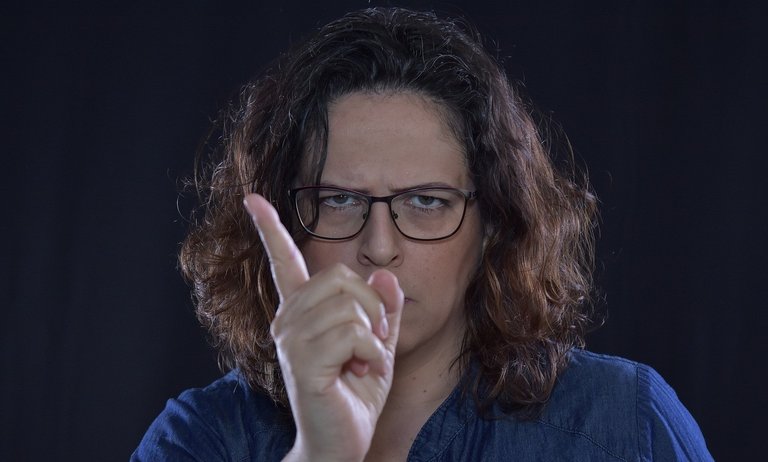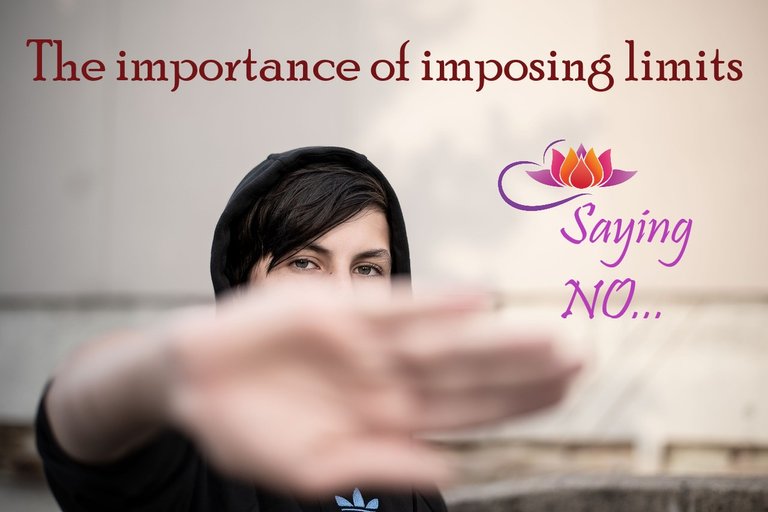

¡Qué difícil es decir la palabra no!
Todos la sabemos articular, pero este acto de reconocimiento y de respeto hacia uno mismo, que aumenta la autoestima y el autoconcepto, y que coloca límites donde deben ir, de acuerdo a nuestras necesidades, es difícil de decir a nivel social.
¿Por qué no lo hacemos?
Pues, por miedo a la reacción del otro, al daño al otro; por temor a lo que el otro piense.
Y, contrario a lo que creemos, cuando los seres humanos colocan límites en forma educada y correcta, son mayormente valorados y se toman más en cuenta para el respeto.


¿Por qué es importante decir no?
Últimamente, he estado tratando de desarrollar temáticas que mejoren nuestra asertividad; y, además, esta es una de las metas de la comunidad de @Holos-lotus, la de mejorar el bienestar y la de dar a conocer estrategias para que podamos ser más asertivos en la vida.
El aprender a decir que no, es un tema que muchas veces hemos tocado, pero que muy pocas veces ponemos en práctica en forma constante.
La motivación que podemos tener hacia el desarrollo de la inteligencia emocional y, por lo tanto, hacia la asertividad; se ve empañada cuando no podemos imponer límites.
Por lo que, siempre existe la posibilidad de tener el sentimiento de culpa y la idealización errada de ser o quedar como una mala persona.
El miedo a que los demás se enfaden es algo que siempre va a estar allí, por lo que debemos entender que, con este acto, evitamos la manipulación de los otros, potenciamos nuestra autoestima y, sobre todo, nos evitamos las complicaciones de quedar mal o de generar malestar emocional y negatividad en nosotros mismos.

En realidad, le tememos a las críticas
En mi experiencia, he podido notar que lo que en realidad nos impide facilitar en nosotros la expresión negativa y delimitar, es la crítica y el miedo a contraatacar.
Sin embargo, en cuerpomente.com, pude conseguir una regla de oro para estos casos, que consiste en no negar las críticas ni en contraatacar con otras críticas diferentes.
Ante esto, se puede admitir que la afirmación que emiten hacia nosotros, sea cierta; o se puede reconocer que puede ser cierta; y por último, se puede expresar que la afirmación puede ser lógica.
Respuestas que no conllevan contenciones ni malos entendidos.
Reaccionando de cualquiera de estas maneras, podemos comenzar a hacerle frente a una de las cosas que nos impiden decir no y actuar en forma asertiva ante las críticas, manteniendo, siempre, nuestra actitud de tranquilidad.

¿Cómo podemos practicar él no?
Me gusta pedirles a las personas que visualicen diferentes situaciones y que se vean limitando, en las que no se sientan a gusto o ante las situaciones que puedan representar un peligro o una complicación.
Esta es una sugerencia que muchos terapeutas hacen en sus consultas y en los blogs de salud.
Pero también, además de la visualización, debemos aprender a disculparnos solo o únicamente cuando sea necesario.
Porque tendemos a hacer de las disculpas algo completamente normal y cotidiano, y la disculpa constante en nuestro discurso debilita a las disculpas que son necesarias de hacer.
Por ejemplo: “Siento mucho decirle que no a lo que me estás pidiendo”, o, “lo lamento, pero no puedo”.
Igualmente, debemos practicar la educación y la empatía; porque ante una negativa que debemos ofrecer, tiene que estar de por medio el entender y escuchar al otro, el permitir que el otro nos explique por qué necesita que accedamos a algo.
Y para eso debemos reconocer en qué situación se encuentra la otra persona y responder en forma correcta y educada que no podemos acceder.
Por último, la forma de hablar es importante para no herir ni dejar en entredicho la razón de mí "no"; por eso, digamos un no en forma rotunda, sin ser agresivos, pero en forma clara y calmada.

¿Y si no aprendo a decirlo nunca?
Bueno, pues hay que empezar a practicar y a buscar dentro de nosotros las razones por las cuales no podemos poner límites.
Y es que, las consecuencias de no poder decir que no a tiempo, además de las que ya hemos hablado, son, la baja autoestima, el sentimiento de soledad interior y el sentimiento de fracaso.
Sí, pues, aunque no lo creamos, estas tres situaciones son desvalorizantes para cualquier ser humano y pueden traer consecuencias nefastas para la salud mental.
Por eso, aprende a visualizar, a no explicar en forma excesiva, es decir, a dejar de justificarte por todo; y no permitas que te abrumen los pensamientos negativos cuando no puedes hacer algo.
En otras palabras, empieza a quererte, a no mostrarte siempre tan accesible y a dejar de necesitar la aprobación de los demás para poder desarrollarte y evolucionar.
Eso, créeme, no es necesario.


Learning about assertiveness: Saying "no" as a life strategy -Causes and consequences-


How difficult it is to say the word no!
We all know how to articulate it, but this act of recognition and self-respect, which increases self-esteem and self-concept, and which places limits where they should go, according to our needs, is difficult to say on a social level.
Why don't we do it?
Well, for fear of the other's reaction, of hurting the other; for fear of what the other thinks.
And, contrary to what we believe, when human beings place limits in a polite and correct way, they are mostly valued and are taken more into account for respect.


Why is it important to say no?
Recently, I have been trying to develop topics that improve our assertiveness; and, in addition, this is one of the goals of the @Holos-lotus community, to improve well-being and to share strategies so that we can be more assertive in life.
Learning to say no is a topic that we have often touched on, but that we rarely put into practice on a consistent basis.
The motivation that we can have towards the development of emotional intelligence and, therefore, towards assertiveness, is tarnished when we cannot impose limits.
Therefore, there is always the possibility of having the feeling of guilt and the mistaken idealization of being or looking like a bad person.
The fear of making others angry is something that will always be there, so we must understand that, with this act, we avoid the manipulation of others, we enhance our self-esteem and, above all, we avoid the complications of looking bad or generating emotional discomfort and negativity in ourselves.

In reality, we are afraid of criticism
In my experience, I have noticed that what actually prevents us from facilitating negative expression and delimiting is criticism and the fear of counterattacking.
However, in cuerpomente.com, I was able to get a golden rule for these cases, which consists in not denying criticism or counterattacking with other different criticisms.
In the face of this, one can admit that the statement that they emit towards us, is true; or one can recognize that it may be true; and finally, one can express that the statement may be logical.
Responses that do not entail contentions or misunderstandings.
By reacting in any of these ways, we can begin to confront one of the things that prevent us from saying no and acting assertively in the face of criticism, while maintaining our calm attitude.

How can we practice saying no?
I like to ask people to visualize different situations and see themselves limiting themselves, where they do not feel comfortable or in situations that may represent a danger or a complication.
This is a suggestion that many therapists make in their consultations and in health blogs.
But also, in addition to visualization, we must learn to apologize only or only when necessary.
Because we tend to make apologies something completely normal and everyday, and the constant apology in our speech weakens the apologies that are necessary to make.
For example: "I'm sorry to say no to what you are asking me to do", or, "I'm sorry, but I can't".
Likewise, we must practice education and empathy; because in the face of a refusal that we must offer, we must understand and listen to the other person, allowing the other person to explain why he/she needs us to agree to something.
And for that we must recognize what situation the other person is in and respond in a correct and polite way that we cannot agree.
Finally, the way we speak is important so as not to hurt or question the reason for my "no"; therefore, let's say a "no" in a clear and calm way, without being aggressive, but in a clear and calm way.

What if I never learn to say it?
Well, we have to start practicing and looking inside ourselves for the reasons why we cannot set limits.
And the consequences of not being able to say no in time, in addition to those we have already talked about, are low self-esteem, the feeling of inner loneliness and the feeling of failure.
Yes, believe it or not, these three situations are devaluing for any human being and can have dire consequences for mental health.
Therefore, learn to visualize, not to over-explain, that is, to stop justifying yourself for everything; and do not allow yourself to be overwhelmed by negative thoughts when you cannot do something.
In other words, start to love yourself, to not always be so accessible and to stop needing the approval of others in order to develop and evolve.
That, believe me, is not necessary.

Emilio Ríos – Venezuela
@emiliorios


- Barras separadoras y logo de English, editadas en Paint, de:
Separator bars and English logo edited in Paint, from:
Pixabay-JodyDellDavis
Cintillo personalizado de @emiliorios con el logo de #Hive, realizado por la excelente creadora @mosa71
Custom @emiliorios headband with the #Hive logo, made by the excellent creator @mosa71Nuevo logo de Twitter tomado de la plataforma de la red social.
New Twitter logo taken from the social network platform.Imagen de agradecimiento, tomando el logo de nuestra comunidad y editado en Paint, de:
Thank you image, taking our community logo and edited in Paint, by:
Pixabay-Jplenio
- Logo de la comunidad, de:
Community logo, by:
Pixabay-Clker-2405360
- Si lo deseas, puedes seguirnos en:
If you wish, you can follow us at:





